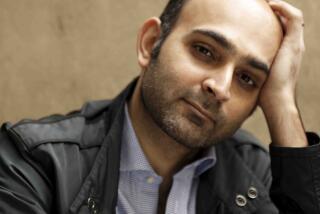Riz Ahmed burns with intensity as a British-Pakistani rapper in ‘Mogul Mowgli’
- Share via
The Times is committed to reviewing theatrical film releases during the COVID-19 pandemic. Because moviegoing carries risks during this time, we remind readers to follow health and safety guidelines as outlined by the Centers for Disease Control and Prevention and local health officials.
British-Pakistani rapper Zed (Riz Ahmed) plays a cassette tape from years prior, when he had recorded himself spitting English-language verses, until a tune native to his parents’ homeland reemerges from underneath the Western-style mode of expression.
That overlapping duality, of two identities always at odds though inextricable, permeates “Mogul Mowgli,” a poignantly propulsive and furiously constructed story by director Bassam Tariq about inherited pain of the flesh and the soul.
From his perpetual cultural limbo, which many children of immigrants occupy, Zed formulated his rage-filled lyrics. Ahmed, not only a gifted thespian but also a rapper in real life, co-wrote the screenplay. He burns through the onstage performance sequences, confirming that under the fictional veneer there’s a channeling of lived-in truth.
But a seemingly sudden debilitating condition forces Zed to surrender a dream opportunity to a rival. In the care of his traditionally minded father, Bashir (Alyy Khan), he is haunted by an apparition referred to as Toba Tek Singh, taken from a satirical tale about the separation between India and Pakistan. Covered in flowers, it’s the ghost of an irreparable schism.
Tariq intercuts two timelines, Zed’s present with Bashir’s past, in a flurry of motion and transitions without being literal about the rupture and uprooting that they evoke. The son experiences his father’s memories as if implanted through his genetic makeup. There’s a moving train, an incident at the family’s restaurant, a nightmarish rap battle, as well as home videos of Ahmed’s actual childhood (which further embeds him in a meta manner).
The purposefully erratic vibrancy of the imagery plays like a dialogue between cinematographer Annika Summerson’s off-center framing in the boxy aspect ratio and editors Hazel Baillie and Adam Biskupski’s precisely fluid assembly. Though not all its gyrating parts and magical realist flourishes congeal, this feverish visual parlance rouses.
Embracing the character’s physical infirmity, Ahmed stuns with a performance of unguarded fragility and growing frustration, even more affecting in its heartrending rawness than his Oscar-nominated turn in “Sound of Metal,” coincidentally also centering a musician on the rise whose dreams are derailed by chronic illness.
Titled after a track that addressed the in-between state of a first-gen individual by the Swet Shop Boys, a band Ahmed is a former member of, “Mogul Mowgli” poses grave existential queries in formally auspicious ways. Is he Zaheer, his birth name, or Zed, his adopted one? By the same token, is he British or Pakistani? Is his destiny of his own making or the result of accumulated baggage? No facile answer will suffice.
‘Mogul Mowgli’
In English and Urdu with English subtitles
Not Rated
Running time: 1 hour, 30 minutes
Playing: Starts Sept. 3 in limited release, including the Landmark Nuart, West L.A.
More to Read
Only good movies
Get the Indie Focus newsletter, Mark Olsen's weekly guide to the world of cinema.
You may occasionally receive promotional content from the Los Angeles Times.










